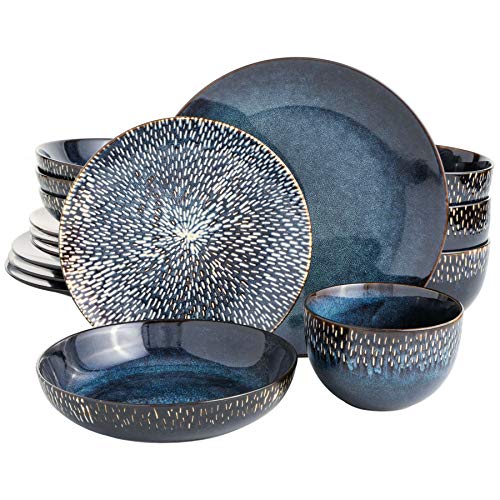10 Best Pizza Pans To Use, Top Choices
Discover the ultimate pizza-making companions with our selection of the best pizza pans to use at home. From traditional round pans to versatile perforated trays, these options ensure perfect pies every time. Crafted for even heat distribution and durability, they guarantee crispy crusts and delicious toppings. Whether you prefer thin and crispy or thick and fluffy crusts, these pans deliver professional results in your own kitchen. Say goodbye to soggy bottoms and hello to pizza perfection with our top picks.

Looking for the best pizza pans to use? Look no further! In this comprehensive review, we'll explore top-rated pizza pans that deliver the perfect crust every time. Whether you're a seasoned pizza chef or a home cook looking to elevate your pizza game, we've got you covered. Let's dive in and find the ultimate pizza pan for your kitchen.
How to Choose the Pizza Pans to Use
Cast Iron Pizza Pan
- Cast iron pans are renowned for their excellent heat retention and ability to produce crispy crusts.
- They can withstand high temperatures, making them suitable for baking pizzas in ovens, on grills, or even over campfires.
- Seasoned cast iron pans develop a natural non-stick surface over time, enhancing their performance and durability.
- Their versatility allows for baking a wide range of pizza styles, from thin and crispy to thick and chewy.
Pizza Stone
- Pizza stones are made from natural materials like ceramic, cordierite, or clay, and are designed to mimic the cooking surface of traditional brick ovens.
- They absorb moisture from the dough, resulting in a crispy crust with a tender interior.
- Pizza stones can be preheated in the oven to create a hot surface that cooks pizzas quickly and evenly.
- They're ideal for baking thin-crust pizzas and can also be used to bake bread, pastries, and other baked goods.
Perforated Pizza Pan
- Perforated pizza pans feature holes or perforations on the bottom, allowing air to circulate and moisture to escape during baking.
- This design promotes even browning and crisping of the crust, producing a uniformly cooked pizza with a crispy bottom.
- Perforated pans are suitable for baking thin-crust pizzas and are often used in professional pizzerias to achieve that classic crispy texture.
- They're available in various materials, including aluminum and steel, and come in different shapes and sizes to accommodate different pizza sizes and cooking preferences.
Deep-Dish Pizza Pan
- Deep-dish pizza pans have tall sides, allowing for the creation of thick, hearty pizzas with generous toppings.
- They're typically made from heavy-duty materials like aluminum or steel to withstand the weight of the dough and toppings.
- Deep-dish pans often feature a non-stick coating or seasoning to prevent sticking and facilitate easy release of the pizza.
- These pans are ideal for making Chicago-style deep-dish pizzas and other thick-crust variations.
Carbon Steel Pizza Pan
- Carbon steel pans offer excellent heat conductivity and durability, making them a popular choice among professional chefs and home cooks.
- They develop a natural non-stick surface when seasoned properly, allowing for easy release of pizzas and minimal cleanup.
- Carbon steel pans heat up quickly and evenly, resulting in uniformly cooked pizzas with crispy crusts.
- They're suitable for baking a wide range of pizza styles and can be used in ovens, on grills, or even over open flames.
- KR Score9.8
Kitchensradar.com established a ranking system called KR Score. KR Score is unaffected or unrelated to any websites run by manufacturers or sales agents. Learn more
- BrandGoodCook
- KR Score9.6
Kitchensradar.com established a ranking system called KR Score. KR Score is unaffected or unrelated to any websites run by manufacturers or sales agents. Learn more
- BrandHandook
- KR Score9.5
Kitchensradar.com established a ranking system called KR Score. KR Score is unaffected or unrelated to any websites run by manufacturers or sales agents. Learn more
- BrandNutriChef
- KR Score9.3
Kitchensradar.com established a ranking system called KR Score. KR Score is unaffected or unrelated to any websites run by manufacturers or sales agents. Learn more
- BrandNutriChef
- KR Score9.1
Kitchensradar.com established a ranking system called KR Score. KR Score is unaffected or unrelated to any websites run by manufacturers or sales agents. Learn more
- BrandTeamFar
- KR Score9.0
Kitchensradar.com established a ranking system called KR Score. KR Score is unaffected or unrelated to any websites run by manufacturers or sales agents. Learn more
- BrandBaker's Secret
- KR Score8.9
Kitchensradar.com established a ranking system called KR Score. KR Score is unaffected or unrelated to any websites run by manufacturers or sales agents. Learn more
- BrandYododo
- KR Score8.8
Kitchensradar.com established a ranking system called KR Score. KR Score is unaffected or unrelated to any websites run by manufacturers or sales agents. Learn more
- BrandRtteri
- KR Score8.6
Kitchensradar.com established a ranking system called KR Score. KR Score is unaffected or unrelated to any websites run by manufacturers or sales agents. Learn more
- BrandMaplefield
- KR Score8.4
Kitchensradar.com established a ranking system called KR Score. KR Score is unaffected or unrelated to any websites run by manufacturers or sales agents. Learn more
- BrandCamerons
Last update on 2024-08-20 / Affiliate links / Images, Product Titles, and Product Highlights from Amazon Product Advertising API
The choice of pan for making pizza depends on personal preference and the type of crust you prefer. Common options include:
- Pizza Stone: Ideal for achieving a crispy crust, pizza stones distribute heat evenly and absorb moisture from the dough.
- Cast Iron Pizza Pan: Cast iron pans offer excellent heat retention and produce a crispy crust with a slightly chewy interior.
- Aluminum Pizza Pan: Aluminum pans are lightweight and conduct heat well, making them suitable for achieving a golden-brown crust.
- Perforated Pizza Pan: These pans have holes that allow moisture to escape, resulting in a crisper crust, especially for thin-crust pizzas.
Are pizza pans with holes better?
Pizza pans with holes, also known as perforated pizza pans, can be beneficial for achieving a crisper crust, especially for thin-crust pizzas. The holes allow moisture to escape, preventing the crust from becoming soggy and ensuring even baking. However, whether they are "better" depends on personal preference and the type of crust you prefer.
Is an aluminum pizza pan good?
Aluminum pizza pans are a popular choice for making pizza because they are lightweight, conduct heat well, and are generally affordable. They can help achieve a golden-brown crust, but the texture may not be as crispy as that achieved with a pizza stone or cast iron pan.
Is stainless steel good for pizza?
Stainless steel pizza pans can be suitable for making pizza, but they may not provide the same level of heat retention or even heating as other materials like cast iron or pizza stones. However, stainless steel pans are durable, easy to clean, and can produce satisfactory results, especially for home cooks.
Which is better, pizza stone or cast iron pizza pan?
Both pizza stones and cast iron pizza pans have their advantages:
- Pizza Stone: Ideal for achieving a crispy crust, pizza stones distribute heat evenly throughout the pizza and absorb moisture from the dough, resulting in a crispy bottom crust.
- Cast Iron Pizza Pan: Cast iron pans offer superior heat retention and produce a crispy crust with a slightly chewy interior. They require seasoning but develop a natural non-stick surface over time. Ultimately, the choice between a pizza stone and a cast iron pan depends on personal preference and the desired crust texture.
Related Posts:
An Exhaustive Guide To The Best Pizza Pan For Homemade Pizza
10 Best Pizza Pans Reviews, Reviews & FAQs
Best Pizza Pan For Home For Fast And Easy
10 Best Pan To Cook Pizza In Oven, Ranked By Experts




























